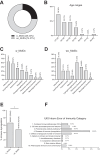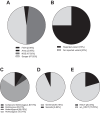Enrichment of Immune Dysregulation Disorders in Adult Patients with Human Inborn Errors of Immunity
- PMID: 38363452
- PMCID: PMC10873437
- DOI: 10.1007/s10875-024-01664-2
Enrichment of Immune Dysregulation Disorders in Adult Patients with Human Inborn Errors of Immunity
Abstract
Human inborn errors of immunity (IEI) comprise a group of diseases resulting from molecular variants that compromise innate and adaptive immunity. Clinical features of IEI patients are dominated by susceptibility to a spectrum of infectious diseases, as well as autoimmune, autoinflammatory, allergic, and malignant phenotypes that usually appear in childhood, which is when the diagnosis is typically made. However, some IEI patients are identified in adulthood due to symptomatic delay of the disease or other reasons that prevent the request for a molecular study. The application of next-generation sequencing (NGS) as a diagnostic technique has given rise to an ever-increasing identification of IEI-monogenic causes, thus improving the diagnostic yield and facilitating the possibility of personalized treatment. This work was a retrospective study of 173 adults with IEI suspicion that were sequenced between 2005 and 2023. Sanger, targeted gene-panel, and whole exome sequencing were used for molecular diagnosis. Disease-causing variants were identified in 44 of 173 (25.43%) patients. The clinical phenotype of these 44 patients was mostly related to infection susceptibility (63.64%). An enrichment of immune dysregulation diseases was found when cohorts with molecular diagnosis were compared to those without. Immune dysregulation disorders, group 4 from the International Union of Immunological Societies Expert Committee (IUIS), were the most prevalent among these adult patients. Immune dysregulation as a new item in the Jeffrey Model Foundation warning signs for adults significantly increases the sensitivity for the identification of patients with an IEI-producing molecular defect.
Keywords: Autoimmune lymphoproliferative syndrome (ALPS); Jeffrey model foundation warning signs; NGS; autoimmunity; germline variants; human inborn errors of immunity (IEI); immune dysregulation; infections; lymphoproliferation; primary immune regulatory disorders (PIRD); somatic variants.
© 2024. The Author(s).
Conflict of interest statement
The authors declare no competing interests.
Figures


Similar articles
-
Unmasking inborn errors of immunity: identifying the red flags of immune dysregulation.Front Immunol. 2024 Dec 19;15:1497921. doi: 10.3389/fimmu.2024.1497921. eCollection 2024. Front Immunol. 2024. PMID: 39749336 Free PMC article. Review.
-
Clinical exome sequencing data from patients with inborn errors of immunity: Cohort level diagnostic yield and the benefit of systematic reanalysis.Clin Immunol. 2024 Nov;268:110375. doi: 10.1016/j.clim.2024.110375. Epub 2024 Oct 5. Clin Immunol. 2024. PMID: 39369972
-
Implementation of Early Next-Generation Sequencing for Inborn Errors of Immunity: A Prospective Observational Cohort Study of Diagnostic Yield and Clinical Implications in Dutch Genome Diagnostic Centers.Front Immunol. 2021 Dec 21;12:780134. doi: 10.3389/fimmu.2021.780134. eCollection 2021. Front Immunol. 2021. PMID: 34992599 Free PMC article.
-
Diagnostic Challenges in Patients with Inborn Errors of Immunity with Different Manifestations of Immune Dysregulation.J Clin Med. 2022 Jul 20;11(14):4220. doi: 10.3390/jcm11144220. J Clin Med. 2022. PMID: 35887984 Free PMC article. Review.
-
Future of Therapy for Inborn Errors of Immunity.Clin Rev Allergy Immunol. 2022 Aug;63(1):75-89. doi: 10.1007/s12016-021-08916-8. Epub 2022 Jan 12. Clin Rev Allergy Immunol. 2022. PMID: 35020169 Free PMC article. Review.
Cited by
-
Clinical significance of very high IgE levels (≥1000 IU/mL): Population-based study of 118,211 adults.J Allergy Clin Immunol Glob. 2025 Jan 9;4(2):100403. doi: 10.1016/j.jacig.2025.100403. eCollection 2025 May. J Allergy Clin Immunol Glob. 2025. PMID: 39931077 Free PMC article.
-
X-linked Deficiency in ELF4 in Females with Skewed X Chromosome Inactivation.J Clin Immunol. 2025 Feb 20;45(1):76. doi: 10.1007/s10875-025-01866-2. J Clin Immunol. 2025. PMID: 39976696 Free PMC article.
-
Persistent Neutropenia and Atopy in an Adolescent: A Subtle Presentation of Phosphoglucomutase 3 Deficiency.Cureus. 2025 Jun 22;17(6):e86531. doi: 10.7759/cureus.86531. eCollection 2025 Jun. Cureus. 2025. PMID: 40698220 Free PMC article.
References
-
- Tangye SG, Al-Herz W, Bousfiha A, Cunningham-Rundles C, Franco JL, Holland SM, et al. (2022) Human Inborn Errors of Immunity: 2022 Update on the Classification from the International Union of Immunological Societies Expert Committee 42 Journal of Clinical Immunology. Springer US 1473–1507 Available from: 10.1007/s10875-022-01289-3 - PMC - PubMed
Publication types
MeSH terms
Grants and funding
LinkOut - more resources
Full Text Sources
Medical

